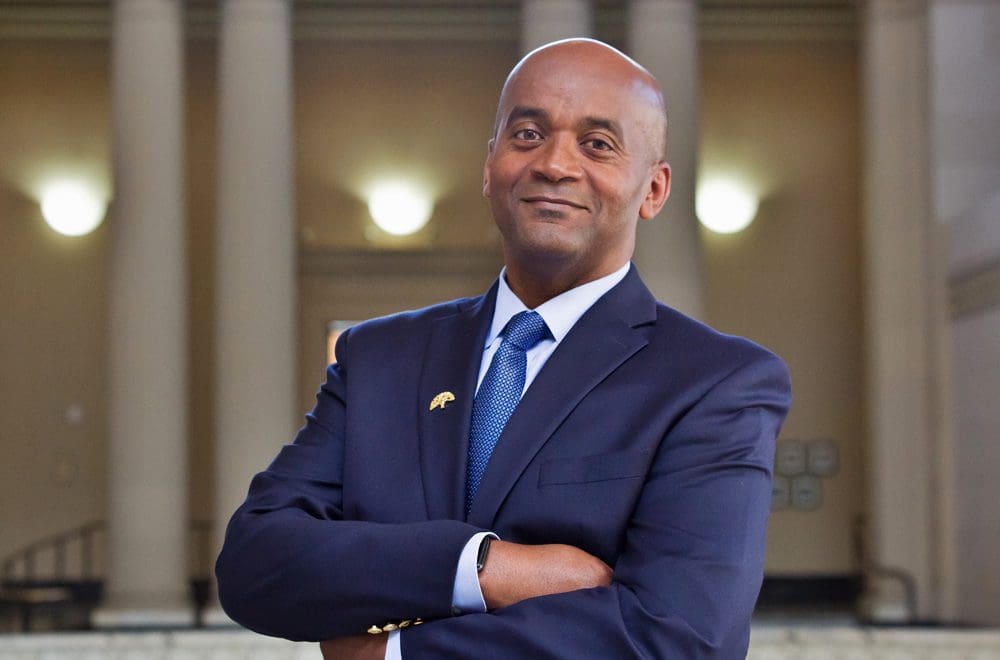
Hi there. Nice to see you again.
Judge Colin T. Bowen is a Judge sitting on the Alameda County Superior Court in California. He was appointed to the bench by former Governor Edmund Gerald Brown in 2018. Prior to his appointment to the bench, Judge Bowen was a trial attorney in both criminal and civil practice.
Judge Bowen received his B.A. from the University of California, Los Angeles, and his Juris Doctorate from the University of California, Berkeley School of Law.
I had the honor of sitting down with Judge Bowen and learning more about his personal and professional journey. His supportive and empowering words inspired me in many ways, and I’m sure they will inspire you as well.
Thank you so much for sitting down with me today. We’re honored to have you! What inspired you to reach out to the NSA?
I’ve never been part of an organization where people stutter. I’ve never been in a situation where I’m talking openly to someone like you, who has stuttered. I’ve always been community-oriented, and I like to help and empower. I’ve done this for so many different people, but not for a community that’s so personal to me.
Two things in particular inspired me to reach out. First, I do a lot of work with youth. I recently did a presentation at a school for the deaf, and that affected me a great deal. Communication is pivotal to the law, and the thing they struggle with is communication – communicating in a hearing world. As bizarre as it was, I felt a connection to them, to their frustration, in terms of the challenges of communication.
The second thing that happened, at about the same time, was watching Joe Biden on the campaign trail. People who don’t stutter simply see a politician who sometimes fumbles over his words and makes occasional verbal gaffes. However, those of us who do stutter, have an incredible appreciation for the immense courage, resilience and determination he must have to put himself out there as he does. He has a stutter, and he’s still in politics and in the public limelight. I have been in public forums many times, but I have never shared that I stutter, and part of the reason for that is that, the legal field is filled with judgement and criticism. I want folks to focus on what I say – not how I say it. Regardless of his/your politics, I have a unique appreciation for Joe Biden’s path and the challenges he faces – including public misperception.
You are a former trial attorney and now a judge. What inspired you to go into the field of law?
I think it was the challenge. Some people thought that law was a bizarre path, and every step of the way was hard. Law is an environment of communication, and I not only wanted to be a lawyer, I wanted to be a trial lawyer, where you have to strive to communicate effectively in a very public forum. Now in my role as a judge, I understand that the attorneys and litigants rely on the court to provide guidance and make decisions right away – there is no pause button that I can hit to give me a moment to figure out how to say something.
Every time that I go onto the bench, there all of these mechanisms I have to do to be fluent. I think that appearing externally fluent holds its own challenges, because people react if you deviate from that. As a judge in jury trials, I have to read the jury instructions verbatim to the end, and I often have to change or skip words. In trial, it’s easier to be more fluent for longer.
I was thinking about this before our interview: the one thing about being a trial attorney and being in the legal profession, you have somebody’s rights, and it’s not acceptable for you not to be able to properly represent them. That almost… necessity…makes you feel as though there’s no choice, and that might drive me to be less blocked.
I’ve been privileged to receive recognition for work that I’ve done in the community – and I thoroughly appreciate those – but to me, one of my greatest accomplishment is something that until this interview, very few people have known about me – that I have been able to progress or succeed in my profession with a stutter.
That’s incredibly powerful! Have you always had such determination?
I was born in an industrial town in northern England, a very working class part of England. I can’t think of anyone from my school who went to college. Our school trips were to industry, because that’s what they assumed we would be, and I always resented that. I wanted to do something that I wanted to do – not what they wanted me to do.
I don’t remember being particularly traumatized, even though I stuttered a lot and was teased a lot. There were other things that were more pressing – being a person of color, making my way through the education system and college…I also drew a lot of strength from my parents, who emigrated from Jamaica. They worked every day and wanted their kids to have more than they had. That sort of determination is born of circumstances.
It’s a challenge, but it’s something that’s part of my nature now. If I’d listened to other people – or to myself – saying I couldn’t or shouldn’t do this or that, I would never be able to experience what I’m able to experience or affect lives in the way that I’m able to affect lives now.
Has your relationship with your stutter shifted?
More recently, I’ve re-coined or rephrased the relationship. It’s a part of me, and I don’t deny that, but it’s not all that I am. I’m more than the stutter, and the more that I focus on me – what I want to say and what I want to convey – the better I think I can deal with it. It will always be there, but if I increase the size of me, then it will shrink in comparison. There were times when it was way bigger. It was a weight, and I was almost attached to it.
I think it’s taken a lot from me. I probably would be a very different person if I didn’t stutter. I would have done different things, asked different questions…but I wouldn’t be a better person, or more of a person. I also take from it. I’ve rephrased the power dynamic so that now I’m more in charge. There are many different roads in terms of what works for you. If you find something that helps you, fantastic. That’s the goal!
Are there any particular moments or experiences that helped you develop this empowering relationship with your stutter?
Every milestone inspires reflection. I didn’t think I’d be able to get through law school, and I graduated. The very first trial I had, I didn’t think I would be able to get through it. I practiced and spoke to myself a lot, which is something I’ve done my whole life, but I got up and I said my name, and as soon as I said my name, I thought, “I can do this!” So I knew I could do more than that. It was surprising, but inspiring – and a point of no return. Likewise, if I have a bad day, I’ve done it before, so I know I can do it again.
I’ve always been inspired knowing that certain famous people stutter. It’s the same thing: if this person did it, then you can, too! It’s doable. That always inspires me. Also, seeing how hard my parents had it in another country and their will, grit, and determination as they struggled still helps carry me through difficult times.
Is there something that you wish someone had told you when you were younger?
That I could do something. The teachers all assumed that we would go into the factories, and it would have been nice to have people think, “The sky’s the limit.” I think the most important thing is knowing that there’s nothing stopping you from doing what you want to do or being what you want to be. That would have been helpful.
What words of support would you like to share with others?
Anyone who stutters has special talents. First, it makes you more thoughtful, more introspective, and it makes you love the English language, because you respect the value of words and thoughts. In the practice of law, I’m used to people using words like they’re disposable, or meaningless. People who stutter have such an appreciation of how hard it can be to communicate just one thought. You are aware of how people say things, of what you want to say, of how grammar goes, and you have to have a more extensive vocabulary, because, in a split second, you have to be able to switch out a word that you can’t say. You’re also very empathetic, because you know what it feels like. If I hear someone who stutters, I feel it like it’s me stuttering.
Then there’s courage. If stuttering has blocked things in your life, you might not stop to think about how you’re being courageous. Being able to interact regardless of this, it takes character, and it takes courage. It’s not a choice: you have to be courageous! It comes with the territory.
I hope that anyone who reads this understands that I’ve had very dark times, when I focused on my stutter a lot. But it almost becomes a self-fulfilling prophecy: you focus on it, and you give it life. The stutter isn’t anything you deny, but you can focus on yourself versus giving it power. Lots of people have been able to do it! I’m able to do it, you’re able to do it. Embrace yourself, not just the stutter.
There are many ways to think about effective communication, and, as you’ve shared, you have a great appreciation of words. What does effective communication mean to you?
That I feel, at the end of it, that I was able to convey the thought and meaning and intent that I wanted to. It might not be perfect, but it was all the major things that I wanted it to be.
I can relate to that so much, and I want to thank you for taking the time to do this interview.
I’ve enjoyed it, too, and I would thank you. I’ve thought and talked about things that I really haven’t with anybody, so I really appreciate that. It’s nice to be able to speak about it, and I would really like the opportunity to impact or empower teenagers and young adults – because that’s the time for me that was the most difficult.
I think I’ve reached an interesting point: I wouldn’t typically share this, so it will be interesting if anyone reads about it. I hope that it reaches a single person that it might help or empower. Then I’ll feel truly happy.

Jamie Wolff (aka James) is a New York creative arts therapist – turned personal trainer – turned health coach and curriculum developer. As a writer Jamie believes that stories matter; the stories we share and the stories we tell ourselves – they matter. Jamie serves as the NSA Spotlight Writer.

